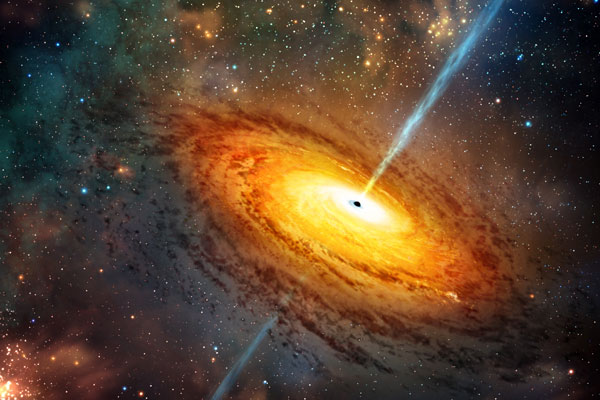The argument rejects Stephen Hawking's hypothetical black hole universe
Recently, assistant professor of physics Dejan Stojkovic and graduate student Anshul Saini conducted a study against the black hole hypothesis of scientist Stephen Hawking.
Oppose Stephen Hawking's hypothetical black hole universe
Concept of space black hole
Scientists have explained that a black hole is an area in space that has a large gravitational field so that its gravity does not allow any form of matter, including light to escape from the boundary (horizon). its event, except for the possibility of material loss from the black hole thanks to the quantum tunnel effect.

Space black hole is always a unknown that attracted the attention of scientists
The matter that wants to escape the black hole must have a escape velocity greater than the speed of light in a vacuum, which cannot happen within the framework of the theory of relativity, where the speed of light in vacuum is velocity. The largest achievable limit of all physical forms. Black holes do not manifest as ordinary bright stars, they are only observed indirectly through the gravitational field interaction of a black hole to the surrounding space.
The theory of black holes is one of the rare physical theories, covering all scales of distance, from the tiny size (Planck ladder) to very large cosmic distances so that it can be verified with both quantum theory and relativity. The existence of black holes is predicted by the theory of general relativity.
Theories of cosmic black holes
In 1970, Stephen Hawking argued that black holes were capable of radiating particles . Through this process, the energy of the black hole will gradually disappear and eventually the black hole will disappear. He then continued to conclude that particles emitted from a black hole would not provide a clue about what lies in the black hole. Accordingly, the information in the black hole will be completely lost with the black hole.

Physics professor Dejan Stojkovic and graduate student Anshul Saini have argued against Stephen Hawking's black hole hypothesis.
However, for scientists, this is difficult to accept because according to quantum mechanics, information must be preserved . Information only becomes difficult to find and cannot be lost because it is related to reality and the past. The concept of 'Information paradox' has existed since that time and is considered to be one of the most fundamental and complex problems in modern physics over the past 40 years.
However, in a recent study by the assistant professor of physics Dejan Stojkovic with graduate student Anshul Saini at the University of Buffalo with specific calculations proved that paradoxes of black hole information could does not exist because information does not disappear . Accordingly, the radiation particles emitted from the black hole may contain information inside the black hole that includes the properties of the materials that form the black hole at the beginning as well as the properties of matter and energy. the amount inside the black hole.
According to Associate Professor Stojkovic, this is an important finding, because although the 'information paradox ' is still controversial, before that, even for physicists with conflicting views, could not explain one. how to convince why information is not lost.
- Stephen Hawking makes the hypothetical hypothesis of a black hole
- Universe origin according to Stephen Hawking's theory
- 10 fascinating facts about black holes
- Albert Einstein was wrong, there was no black hole in the universe?
- Discover the mystery of the most exotic black holes in the universe
- 740 million light years away is a completely different universe of black holes
- Stephen Hawking: Black hole has 'hair'
- Science warns super giant black holes that can
- Stephen Hawking: People should use the energy of black holes to generate electricity
- Detecting a small, black hole,
- The universe can be produced from black holes
- Hawking physicist: Black hole with back door
 'Fine laughs' - Scary and painful torture in ancient times
'Fine laughs' - Scary and painful torture in ancient times The sequence of numbers 142857 of the Egyptian pyramids is known as the strangest number in the world - Why?
The sequence of numbers 142857 of the Egyptian pyramids is known as the strangest number in the world - Why? History of the iron
History of the iron What is alum?
What is alum? The nearest black hole discovered is only 150 light years from Earth
The nearest black hole discovered is only 150 light years from Earth  New discovery of the oldest black hole in the universe
New discovery of the oldest black hole in the universe  The Black Pyramid and the tragedy of deep oblivion: A thousand years later, still no escape from the tragedy of tomb raiding
The Black Pyramid and the tragedy of deep oblivion: A thousand years later, still no escape from the tragedy of tomb raiding  Exploring the 'Black Box of the Earth' project: A device that records the process of human extinction
Exploring the 'Black Box of the Earth' project: A device that records the process of human extinction  Finding the mysterious 'monster' that is making the universe expand
Finding the mysterious 'monster' that is making the universe expand  Why do images of black holes appear to be burning from the outside?
Why do images of black holes appear to be burning from the outside? 